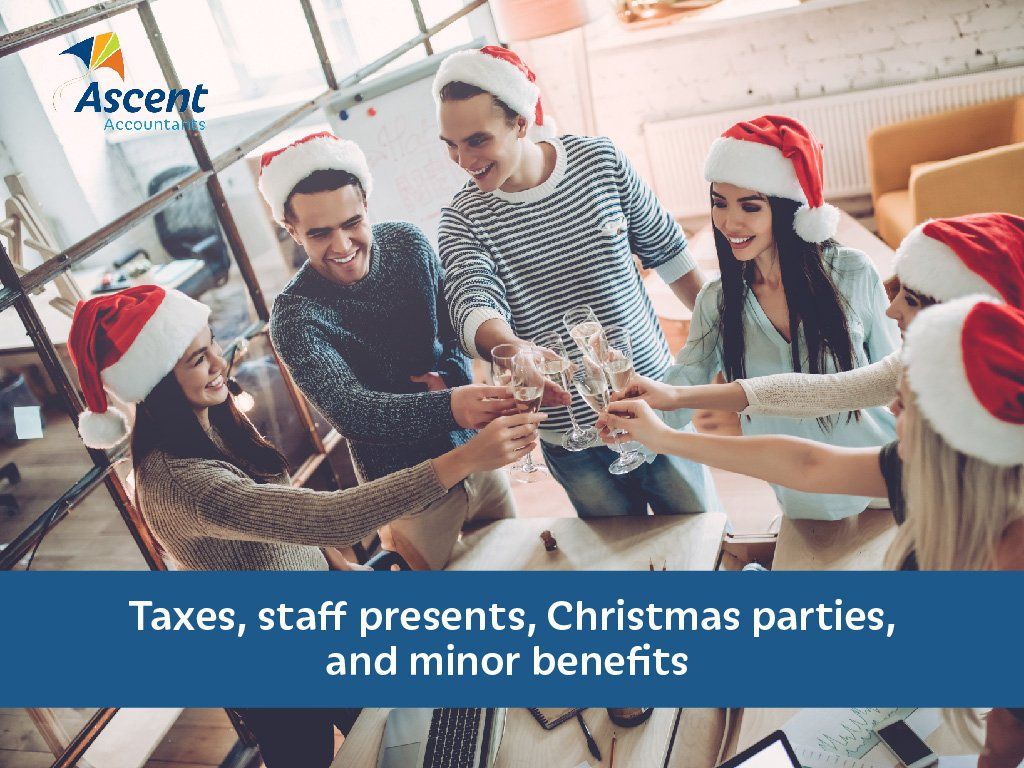Taxes, staff presents, Christmas parties, and minor benefits

With 2022 coming to a close, many businesses will send off the year with Christmas celebrations and gift-giving. Whilst the spirit of generosity is high during this time, these festivities are affected by tax. Do you know the possible FBT (Fringe Benefits Tax) and income tax implications of providing parties and gifts to staff and clients?
Below, we break down everything you need to know about tax this holiday season…
Calculating Christmas expenditure.
Under the FBT Act, employers have the freedom to choose how they calculate their Christmas entertainment expenditure. Popular calculation methods include the 'actual method' and the '50/50 method' — and there’s also the minor benefit exemption to consider with those as well.
The minor benefit exemption.
The minor benefit exemption is an exemption from FBT for most benefits, such as gifts of less than $300 (a $299 gift may be exempt!) given to employees or their family members. Benefits provided around the same time (such as drinks and gifts) are not added together when applying this threshold.
The actual method.
Using this method, entertainment costs are divided between employees, their families, and non-employees (including clients and suppliers). Expenditure on employees is tax deductible and can be liable to FBT. On the other hand, any expenditure on non-employees isn't liable to FBT and therefore isn't valid for any tax deductions.
The 50/50 method.
This method is the more popular choice due to its simple calculation. Here, 50% of the total expenses are subject to FBT and 50% is tax deductible. Just remember that employees' food and drink is not exempt from FBT, even if the event is held on the employer's premises. Similarly, the minor benefit exemption and the general taxi travel exemption don’t apply.
Gift-giving — where does my gift fit in?
As an employer, any Christmas gifts you give to employees or their families fall into one of two categories: entertainment and non-entertainment. For many people, this can be a bit of a “grey area”. As a guide, gifts that are not considered entertainment include things like jewellery, alcohol, or flowers. Gifts that are considered entertainment include event tickets or airline tickets.
Gifts to suppliers, clients and other non-employee work associates — whether the gifts are entertainment or not — are
not FBT liable and
not tax deductible.
Contextual examples.
To put this information into context, let's look at two examples that you might actually be looking at this December.
Scenario: Christmas party.
You’re an employer hosting a Christmas party for your employees and their spouses. Altogether 40 guests attend. The cost of food and drink is $200 per person, and no other provisions were supplied.
Using the actual method: for 40 guests, no FBT is payable, but, the event expenses aren't tax deductible. Using the 50/50 method: the expenditure is $8,000, so $4,000 is liable to FBT and tax deductible.
Scenario: giving a gift that is considered entertainment.
Gifts to employees are tax deductible and are liable to FBT, unless the 'less than $300' minor benefit exemption is applicable.
Scenario: giving a gift that isn’t considered entertainment.
Gifts are liable to FBT, unless the 'less than $300' minor benefit exemption is applicable, and are tax deductible.
Need advice this Christmas?
For more information,
contact Ascent Accounting. As a local accounting firm Perth businesses can rely on, we provide tailored tax accounting, bookkeeping, and more. Tell us about your work Christmas party and intended gifts so we can ensure all the tax is organised correctly.
Need help with your accounting?








